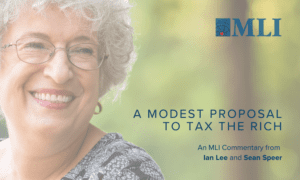This article originally appeared in the Hub.
By Tim Sargent and Peter Copeland, November 4, 2024
While the federal parliament is currently paralysed by gridlock over ongoing contempt motions facing the Trudeau government, when it eventually returns to parliamentary business, one of the biggest facing MPs will be the Bloc Québecois’s bill to boost the Old Age Security program for seniors aged between 65 and 74.
The proposed legislation has set off an intense debate about public spending, intergenerational fairness, and our collective responsibility to Canadians seniors. As political tensions run high, we thought that we’d intervene in the debate with some key facts.
Today, people are living longer than ever. Baby boomers will be the healthiest, longest-lived, and largest cohort of seniors in history. In the coming years, they will be retiring at significant rates, bringing the annual retirement figures in Canada to 250,000.
All the while, young people cannot afford a home to live in, nor do many believe that home ownership will ever be in the cards. Partly as a result, Canada now has one of the lowest birth rates in the developed world, only slightly above Japan. Considering all this, the Bloc Québecois thinks the sensible thing to do is…to increase old age security payments, by up to 10 percent for those 65-74?
Surely, this is justified as a show of support for the vulnerable elderly and to combat ageism and other terrible “-isms” that no doubt afflict those long in the tooth?
Actually, no. As Sean Speer and Ian Lee wrote years ago, a tax on seniors would make more sense because they are wealthier than younger Canadians, and the disproportionate beneficiaries of government programs and spending. Everyone must “pay their fair share,” after all. While that article was written firmly tongue in cheek, with the objective of showing the absurdity of arbitrary notions of fairness, it is worth stopping to consider just how well seniors are doing relative to younger generations.
For starters, incomes tend to be higher among the elderly, along with their total wealth. This is the result of a lifetime of work experience that naturally leads to greater seniority and higher incomes (and disposable income) as well as the accumulation of savings and assets.
Even though lifespans have seen a temporary stagnation, they are expected to continue to rise in the long run. Since 1980, we have seen an increase from 75 to 82 in average life expectancy. As a society, we’ve not yet experienced the effects of a significant proportion of our population living beyond 70-75. With the largest swaths of the boomer generation entering retirement in the next few years, the pressures will become apparent in the coming decade. We can expect to see a growing strain on the public purse through greater uptake of support programs like the CPP, and increased use of public services, like health care.
As lives lengthen, and people remain healthy and active for longer, we may see a natural and healthy shift in the retirement age. As many can no doubt attest, exiting the labour force can be challenging, and rather than go from 100 back to 0 upon retirement, many benefit from reducing their work hours gradually.
Working part-time hours beyond 70 may even be becoming normative, as a good deal of people would like to work past 65 if they could reduce their hours and stress. The labour force participation rate among those 65-70 was 29.3 percent, and 8.2 percent for those above 70 in 2023, so there is room to grow.
Not only would this be good for our economy, but research shows that people who stay in the workforce—in reasonable (not stressful and exhausting) ways—are healthier and happier as they age.
In any case, we shouldn’t be creating a disincentive to work, especially for those near the 60-75-year age range. The proportion of the working-age population relative to the non-working and retired is only expected to grow with current demographic trends. There is a pinch coming from both shockingly low fertility rates, and—on the other end of the spectrum—from longer lifespans. The burden on Canada’s youth to support the aging and elderly will only increase with time.
The current federal government has already made the old age security program more generous for seniors, and they’ve expanded the CPP, which the vast majority of seniors already receive.
Given the significant long-term challenges we face, the government should allocate some of these funds to support younger generations. This could be done by investing in policies that make it easier for Canadians to afford homes and raise families, encouraging those who want to have more children, to do so.
Tim Sargent is Director of the Domestic Policy Program at the Macdonald-Laurier Institute.
Peter Copeland is the deputy director of Domestic Policy at the Macdonald-Laurier Institute.







